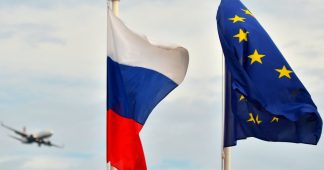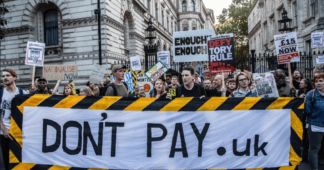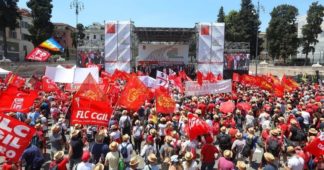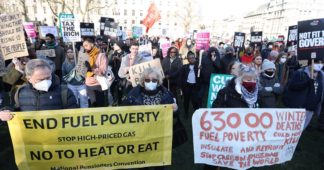Citizens across much of the continent are marching in the streets, protesting against inflation, the Western proxy war in Ukraine, as well as the Washington-led sanctions blitz
Posted on
CategoriesAs inflation and energy prices continue skyrocketing in Europe, people across the continent are protesting against the war in Ukraine and the anti-Russian sanctions, which have raised living costs to intolerable levels, the New York Times reported Friday.
This is making politicians nervous, as winter approaches. “The resignation on Thursday of Prime Minister Liz Truss sent perhaps the clearest signal yet that political peril awaits those who fail to address inflation and the erosion of living standards, no matter the cause,” according to the Times. Studies are showing significant decreases in support for Kiev and the Western proxy war.
The European Union’s annual inflation rate is currently reaching heights not seen in decades – 10.9%, compared to 3.6% this time last year. This is largely driven by the Washington-led sanctions blitz, which has cut the bloc off from the cheap Russian gas upon which it has long relied. As winter approaches, people are making their voices heard. The demonstrations cut across the political spectrum, with the left, right, union members, and poor people all expressing severe discontent. “Strikes and protests over the rising cost of living proliferate, ushering in a period of social and labor unrest not seen since at least the 1970s,” the report says.
Former Italian Prime Minister Giuseppe Conte announced he will join a large demonstration demanding peace in Ukraine and an end to military aid shipments. Italians are becoming restless, “the pressure is everywhere. Trade unions want the government to spend more on energy subsidies to help companies like pottery makers, who need to power their furnaces, but also farmers, who are getting slammed on the cost of fertilizers, which are produced with gas or potassium from Russia.”
Last month, Prague saw massive demonstrations of 70,000 people, across the political spectrum, protesting against NATO’s proxy war in Ukraine and rising energy prices caused by the anti-Russian sanctions. In the Czech Republic, the inflation rate is 17.8%.
Home energy prices continue surging in Hungary where inflation is more than 20%. In response, Prime Minister Viktor Orban has “doubled down on his policy of denouncing sanctions against Russia in pursuit of deals with Russia’s state-owned Gazprom for supplies of natural gas.”
In Germany, Europe’s economic powerhouse, tens of thousands of people are protesting against inflation and support for the proxy war in Ukraine. This is occurring particularly in the eastern states which are “among the country’s poorest, and most conservative.” However, the left is organizing similar demonstrations which “mirror the complaints of the right.” For instance, roughly 1,300 protesters gathered in downtown Leipzig with signs that said “Our country first.”
In France, the gross domestic product will shrink by an estimated $73 billion and there will be a concurrent 1.4 percent drop in purchasing power next year, according to a recent study cited in the report, “with the effect felt largely in poorer households.”
In solidarity with Ukraine, President Emmanuel Macron called on French citizens to endure the economic pain concomitant with propping up Kiev and waging the economic war against Russia. Another study cited in the report shows only a third of the French are willing to bear the brunt of the economic consequences associated with these policies. “On Tuesday, France’s main unions led large demonstrations in Paris, with tens of thousands marching for wage increases, and a survey last week by the polling firm IFOP found that support for Ukraine was down about 5 percentage points since May,” the report said.
* Connor Freeman is the assistant editor and a writer at the Libertarian Institute, primarily covering foreign policy. He is a co-host on the Conflicts of Interest podcast. His writing has been featured in media outlets such as Antiwar.com, Counterpunch, and the Ron Paul Institute for Peace and Prosperity. He has also appeared on Liberty Weekly, Around the Empire, and Parallax Views. You can follow him on Twitter @FreemansMind96.
We remind our readers that publication of articles on our site does not mean that we agree with what is written. Our policy is to publish anything which we consider of interest, so as to assist our readers in forming their opinions. Sometimes we even publish articles with which we totally disagree, since we believe it is important for our readers to be informed on as wide a spectrum of views as possible.











